
Reported speech - 1
Reported speech - 2
Reported speech - 3
Worksheets - handouts

Reported speech
Worksheets - pdf exercises.
- Reported statements - worksheet
- Worksheet - reported questions
- Reported yes/no questions
- Worksheet - reported speech
- Reported speech - exercises pdf
- Indirect speech - exercises
- Reported speech - exercises
- Mixed reported speech 1
- Mixed reported speech 2
- Reported speech 1
- Reported speech 2
- Reported speech 3
- Reported speech 4
- Reported speech 5
- Reported wh- questions
- Reported speech - worksheet
- Reported commands
- Reported questions
- Reported speech 1
- Reported speech 2
- Reported requests and orders
- Reported speech exercise
- Reported questions - worksheet
- Indirect speech - worksheet
- Worksheets pdf - print
- Grammar worksheets - handouts
Grammar - lessons
- Reported speech - grammar notes
- How to use reported speech - lesson
- Tense changes - grammar
Direct and indirect speech exercises PDF
- English grammar PDF
- PDF worksheets
- Mixed PDF tests
- Irregular verbs
- Modal verbs
- If-conditional
- Passive voice
- Reported speech
- Time clauses
- Relative clauses
- Indirect questions
- Question tags
- Imperative sentence
- Gerund and infinitive
- Direct | indirect object
Direct and indirect speech
- Online exercises
- Grammar rules PDF
English grammar books PDF
PDF book 1: English grammar exercises PDF
PDF book 2: English grammar rules PDF
Direct and indirect speech exercises
Reported speech exercises PDF
- Learn how to change tenses, pronouns, expressions of time and place in the reported speech.
Reported questions + commands exercises PDF
- Practise the difference between the direct and indirect speech in questions, commands and requests.
Online exercises with answers:
Direct - indirect speech exercise 1 Rewrite sentences in the reported speech.
Direct - indirect speech exercise 2 Report a short dialogue in the reported speech.
Direct - indirect speech exercise 3 Find and correct mistakes in the reported speech.
Direct - indirect speech exercise 4 Choose correct answers in a multiple choice test.
Indirect - direct speech exercise 5 Rewrite sentences from the reported speech to direct speech.
Reported questions, commands and requests:
Reported questions exercise 6 Change the reported questions and orders into direct questions and orders.
Reported questions exercise 7 Change direct questions into reported questions.
Reported commands exercise 8 Make reported commands and requests.
Grammar rules PDF:
Reported speech rules PDF Changes of tenses, pronouns, time and place in reported statements, questions and commands.
English grammar PDF All PDF rules with examples on e-grammar.org.
Direct + indirect speech
See also: Reported questions + commands
The direct and indirect speech are used to say what other people said, thought or felt. "I like it," he said. - He said that he liked it. "Dan will come," she hoped. - She hoped Dan would come.
The reported (indirect) speech is typically introduced by verbs such as say, tell, admit, complain, explain, remind, reply, think, hope, offer, refuse etc. in the past tense. He said (that) he didn't want it. She explained that she had been at the seaside.
If these verbs are in the past tense, we change the following: a) verb tenses and verb forms b) pronouns c) the adverbs of time and place
A) Verb tenses
We change the tenses in the following way:
- Present - past "I never understand you," she told me. - She told me she never understood me. "We are doing exercises," he explained. - He explained that they were doing exercises.
- Present perfect - past perfect "I have broken the window," he admitted. - He admitted that he had broken the window. "I have been waiting since the morning," he complained. - He complained that he had been waiting since the morning.
- Past - past perfect "She went to Rome," I thought. - I thought that she had gone to Rome. "He was thinking of buying a new car," she said. - She said he had been thinking of buying a new car.
- Will - conditional Will changes into the conditional. I will come on Sunday," he reminded me. - He reminded me that he would come on Sunday.
As you can see, both the past tense and the present perfect change into the past perfect.
Notes 1. I shall, we shall usually become would . "I shall appreciate it," he said. - He said he would appreciate it. 2. I should, we should usually change into would . "We should be really glad," she told us. - She told us they would be really glad. 3. May becomes might . "I may write to him," she promised. - She promised that she might write to him.
The verb forms remain the same in the following cases:
- If we use the past perfect tense. Eva: "I had never seen him." - Eva claimed that she had never seen him.
- If the reporting verb is in the present tense. Bill: "I am enjoying my holiday." - Bill says he is enjoying his holiday. Sandy: "I will never go to work." - Sandy says she will never go to work.
- When we report something that is still true. Dan: "Asia is the largest continent." - Dan said Asia is the largest continent. Emma: "People in Africa are starving." - Emma said people in Africa are starving.
- When a sentence is made and reported at the same time and the fact is still true. Michael: "I am thirsty." - Michael said he is thirsty.
- With modal verbs would, might, could, should, ought to, used to. George: "I would try it." - George said he would try it. Mimi: "I might come." - Mimi said she might come. Steve: "I could fail." - Steve said he could fail. Linda: "He should/ought to stay in bed." - Linda said he should/ought to stay in bed. Mel: "I used to have a car." - Mel said he used to have a car.
- After wish, would rather, had better, it is time. Margo: "I wish they were in Greece." - Margo said she wished they were in Greece. Matt: "I would rather fly." - Matt said he would rather fly. Betty: "They had better go." - Betty said they had better go. Paul: "It is time I got up." - Paul said it was time he got up.
- In if-clauses. Martha: "If I tidied my room, my dad would be happy." - Martha said that if she tidied her room, her dad would be happy.
- In time clauses. Joe: "When I was staying in Madrid I met my best friend." - He said that when he was staying in Madrid he met his best friend.
- We do not change the past tense in spoken English if it is clear from the situation when the action happened. "She did it on Sunday," I said. - I said she did it on Sunday. We must change it, however, in the following sentence, otherwise it will not be clear whether we are talking about the present or past feelings. "I hated her," he said. - He said he had hated her.
- We do not usually change the modal verbs must and needn't . But must can become had to or would have to and needn't can become didn't have to or wouldn't have to if we want to express an obligation. Would/wouldn't have to are used to talk about future obligations. "I must wash up." - He said he must wash up/he had to wash up. "I needn't be at school today." - He said he needn't be/didn't have to be at school that day. "We must do it in June." - He said they would have to do it in June. If the modal verb must does not express obligation, we do not change it. "We must relax for a while." (suggestion) - He said they must relax for a while. "You must be tired after such a trip." (certainty) - He said we must be tired after such a trip.
B) Pronouns
We have to change the pronouns to keep the same meaning of a sentence. "We are the best students," he said. - He said they were the best students. "They called us," he said. - He said they had called them. "I like your jeans," she said. - She said she liked my jeans. "I can lend you my car," he said. - He said he could lend me his car.
Sometimes we have to use a noun instead of a pronoun, otherwise the new sentence is confusing. "He killed them," Kevin said. - Kevin said that the man had killed them. If we only make mechanical changes (Kevin said he had killed them) , the new sentence can have a different meaning - Kevin himself killed them.
This and these are usually substituted. "They will finish it this year," he said. - He said they would finish it that year. "I brought you this book," she said. - She said she had brought me the book. "We want these flowers," they said. - They said they wanted the flowers.
C) Time and place
Let's suppose that we talked to our friend Mary on Friday. And she said: "Greg came yesterday." It means that Greg came on Thursday. If we report Mary's sentence on Sunday, we have to do the following: Mary: "Greg came yesterday." - Mary said that Greg had come the day before. If we say: Mary said Greg had come yesterday , it is not correct, because it means that he came on Saturday.
The time expressions change as follows. now - then, today - that day, tomorrow - the next day/the following day, the day after tomorrow - in two days' time, yesterday - the day before, the day before yesterday - two days before, next week/month - the following week/month, last week/month - the previous week/month, a year ago - a year before/the previous year
Bill: "She will leave tomorrow." - Bill said she would leave the next day. Sam: "She arrived last week." - Sam said she had arrived the previous week. Julie: "He moved a year ago." - Julie said he had moved a year before.
Note If something is said and reported at the same time, the time expressions can remain the same. "I will go on holiday tomorrow," he told me today. - He told me today he would go on holiday tomorrow. "We painted the hall last weekend," she told me this week. - She told me this week they had painted the hall last weekend. On the other hand, if something is reported later, the time expressions are different in the indirect speech. Last week Jim said: "I'm playing next week." If we say his sentence a week later, we will say: Jim said he was playing this week.
Here usually becomes there . But sometimes we make different adjustments. At school: "I'll be here at 10 o'clock," he said. - He said he would be there at 10 o'clock. In Baker Street: "We'll meet here." - He said they would meet in Baker Street.
- All PDF exercises and grammar rules from this website.
- Child Login
- Number Sense
- Measurement
- Pre Algebra
- Figurative Language
- Reading Comprehension
- Reading and Writing
- Science Worksheets
- Social Studies Worksheets
- Math Worksheets
- ELA Worksheets
- Online Worksheets
Browse By Grade
- Become a Member

- Kindergarten

- Active and Passive Voice
- Capitalization
- Comparative and Superlative Adjectives
- Conditionals
- Conjunctions
- Contractions
- Determiners and Quantifiers
- Diagramming Sentences
- Direct and Indirect Objects
- Direct and Indirect Speech
- Double Negatives
- Interjections
- Parts of Speech
- Phrasal Verbs
- Prepositions
- Punctuation
- Question Words
- Sentences for Beginners
- Shift in Verb Tenses
- Simple, Compound, and Complex Sentences
- Subject and Object Complements
- Subject and Predicate
- Subject-Verb Agreement
- Tag Questions
- Transition Words
- Types of Sentences

- Abbreviation
- Alphabetical Order
- Collocations
- Commonly Confused Words
- Compound Words
- Connotations and Denotations
- Crossword Puzzles
- Positive and Negative Connotations
- Shades of Meaning
- Sorting and Categorizing
- Word Search

- Alliteration
- Onomatopoeia
- Personification
- Proverbs and Adages
- Rhyming Words

- Beginning Sounds
- Consonant Blends
- Consonant Digraphs
- Ending Sounds
- Long and Short Vowels
- Middle Sounds
- R-Controlled Vowels
- Silent Letters
- Vowel Digraphs

- Kindergarten Reading Comprehension
- Grade 1 Reading Comprehension
- Grade 2 Reading Comprehension
- Grade 3 Reading Comprehension
- Grade 4 Reading Comprehension
- Grade 5 Reading Comprehension
- Grade 6 Reading Comprehension
- Grade 7 Reading Comprehension
- Grade 8 Reading Comprehension

- Alphabet and Letters
- Cause and Effect
- Dictionary Skills
- Editing and Proofreading
- Facts and Opinions
- Making Predictions
- Word Recognition
Direct and Indirect Speech Worksheets
- Language Arts >
- Grammar >
Fend off any errors that might creep into your speech with our free, printable direct and indirect speech worksheets! We use direct speech to quote the exact same words that someone utters. The indirect speech is used to report someone's speech, often with words slightly changed. Convert a range of sentences including the interrogative, imperative, and exclamatory sentences into reported speech. Make your grammar life richer and more fulfilling with this coveted collection of quoted and reported speech worksheets pdf!
Our direct and reported speech worksheet pdfs are most recommended for children in 4th grade through 8th grade.
Reported Speech with Time Expressions
Kids in 5th grade, 6th grade and 7th grade convert sentences into indirect speech, paying attention to how expressions of time change here. For example, write "that day" for "today" and "the next day" for "tomorrow".
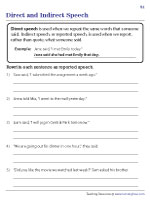
Writing Statements in Reported Speech
Both direct speech and indirect speech have their natural habitat, and children must use each where it belongs. In these direct and indirect speech worksheets pdf, grade 7 and grade 8 kids write each statement as reported speech.
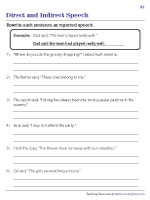
Changing Interrogative Sentences into Reported Speech
Don't write a question mark after "Sam asked me where I was going". This is a statement and not a question, although it contains the word "where". Let children write each interrogative sentence in reported speech here.
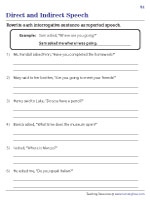
Converting Imperative Sentences into Reported Speech
Watch grade 6 kids rewrite sentences that denote a request, command, or advice in reported speech, using reporting verbs like "ordered", "instructed", and more in these printable direct and indirect speech worksheets!
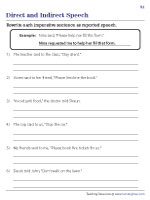
Rewriting Exclamatory Sentences Using Reported Speech
Thanks to scenarios that exclaim – sometimes with joy and other times with sorrow – these grade 8 worksheets are kinetic and ebullient. Upgrade your practice by converting exclamatory sentences into indirect speech.
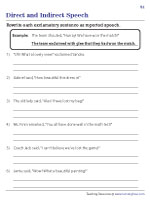
Changing Reported Speech into Direct Speech
In this section of our printable indirect and direct speech worksheets, there are sets of sentences in reported speech, and children are expected to write each sentence in the direct or quoted speech.
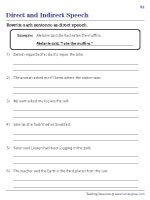
Punctuating Direct Speech
Instruct children in grade 4 and grade 5 to read the given sentences and insert commas and quotation marks wherever necessary to reflect direct speech.
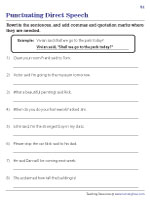
Related Printable Worksheets
▶ Active and Passive Voice
▶ Phrases
▶ Types of Sentences
Tutoringhour
What we offer, information.
- Membership Benefits
- How to Use Online Worksheets
- How to Use Printable Worksheets
- Printing Help
- Testimonial
- Privacy Policy
- Refund Policy
Copyright © 2024 - Tutoringhour
You must be a member to unlock this feature!
Sign up now for only $29.95/year — that's just 8 cents a day!
Printable Worksheets
- 20,000+ Worksheets Across All Subjects
- Access to Answer Key
- Add Worksheets to "My Collections"
- Create Custom Workbooks
Digitally Fillable Worksheets
- 1100+ Math and ELA Worksheets
- Preview and Assign Worksheets
- Create Groups and Add Children
- Track Progress
English Practice Downloadable PDF Grammar and Vocabulary Worksheets
Reported speech (b1).
- RS013 - Reported Speech
- RS012 - Reported Questions and Commands
- RS011 - Reported Speech
- RS010 - Reported Speech
- RS009 - Reported Commands
- RS008 - Reported Questions
- RS007 - Reported Speech
- RS006 - Reported Speech
- RS005 - Reported Speech
- RS004 - Reported Speech
- RS003 - Reported Speech
- RS002 - Reported Speech - Mixed Exercises
- RS001 - Reported Speech - Mixed Exercises
- Adjective - Adverb
- Gerund and Infinitive
- Modal Verbs
- Reported Speech
- Passive Voice
- Definite and Indefinite Articles
- Quantifiers
- Relative Clauses
- Prepositions
- Questions and Negations
- Question Tags
- Language in Use
- Word Formation
- General Vocabulary
- Topical Vocabulary
- Key Word Transformation
News Articles
- Letters and Emails
- Blog Posts and Comments
- Connectives and Linking Phrases
- Phrasal Verbs
- Collocations and Phrases
Listening Comprehension
Privacy policy.
Short Stories & Poems
- Short Stories
- Myths And Legends
Short Story Contest
- Story Contest Rules
- Prize Winning Stories
- Highly Commended Stories
- Outstanding Stories
Books for Kids
- Print Books
Learn with Fun
- Learn English
- Learn Science
- Coding Courses
- Online Quiz
- Competitive Exams
- Learning Videos
- Did You Know
- Amazing Facts
- Great Personalities
- Quotes For Kids
- Teacher Resources
- Parenting Tips
- Health Tips
- Current Affairs
- Useful Links
Videos for Kids
- Nursery Rhymes
- Animated Movies
- Fun Videos for Kids
- Animated Stories
Games for Kids
- Educational Games
- Skill Games
- Puzzle Games
- Girls Games
- Make-up Games
- Dress-up Games
- Cooking Games
- Racing Games
- Sports Games
- Jump & Run Games
- Action Games
- Arcade Games
- Bubble Shooter Games
- Match-3 Games
- Summer Games
- Multiplayer Games
- Board Games
- Halloween Games
- Winter Games
- Easter Games
- Memory Games
- Coloring Games
- Video Games
- Funniest Answers
- Brain Teasers
- Art and Craft
- Coloring Pages
- Recipes for Children
- Subscribe for Free
- Story Contest Stories
Reported Speech (Direct and Indirect Speech)
We may report the words of a speaker in two ways:
a. We may quote his actual words. This is called Direct Speech.
b. We may report what he said without quoting his exact words. This is called Reported or Indirect Speech.
John said, “I am very busy now.” (Direct) John said that he was very busy then. (Indirect/Reported)
It will be noticed that in Direct Speech, we use inverted commas to signify the exact words of the speaker. In Indirect Speech we do not.
Also, in changing the above Direct Speech into Indirect certain changes have been made. Thus:
- We have used the conjunction that before the Indirect statement. (The that is often omitted especially in spoken English.)
- The Pronoun I is changed to he. (The Pronoun is changed in Person)
- The Verb am is changed to was. (Present Tense is changed to Past.)
- The Adverb now is changed to then.
Therefore, it is clear that there are changes that happen when Direct Speech is changed to Indirect Speech.

Basic Verb Shifts for Indirect Speech (statements):
However, if reporting about general truths, we do not need to shift the verb tense back.
For example,
John said, “The sky is blue.” John said that the sky is blue.
Other common changes
You may need to adjust other words. Common changes can be: I to he/she this to that here to there yesterday to the day before today to that day now to then tomorrow to the following day
Reporting questions
When reporting questions, there are certain rules to follow, as is clear from the following examples.
Exclamations and wishes
In reporting exclamations and wishes, the Indirect Speech is introduced by some verb expressing exclamation or wish.
Alice said, “How clever you are!” Alice exclaimed that I was very clever.
Change the following Direct Speech to Indirect Speech.
- He said, “Be quiet and listen to my words.”
- He said, “I shall go as soon as possible.”
- Jill asked, “Why do you look sad?”
- My teacher said, “I have marked your papers.”
- “Will you be at home tomorrow?” my friend asked.
- “What a pretty dress!” Ethel said.
- “Can I drop you home?” asked Harry.
- “I was sick yesterday,” Elena said.
- He urged them to be quiet and listen to his words.
- He said that he would go as soon as possible.
- Jill asked why I looked sad.
- My teacher said that she had marked our papers.
- My friend asked if I would be at home the following day.
- Ethel exclaimed that it was a pretty dress.
- Harry asked whether he could drop me home.
- Elena said that she had been sick the previous day.
Was this article useful? What should we do to improve your experience? Share your valued feedback and suggestions! Help us to serve you better. Donate Now!
Quick Links
- Write For Us
- Stories & Poems
- Privacy Policy
Follow Us On
Subscribe for free.
Direct and Indirect Speech Exercise
Turn the following sentences into indirect speech.
1. John said, ‘I am very busy now.’ 2. He said, ‘The horse has been fed.’ 3. ‘I know her name and address,’ said John. 4. ‘German is easy to learn,’ she said. 5. He said, ‘I am writing letters.’ 6. ‘It is too late to go out,’ Alice said. 7. He said to me, ‘I don’t believe you.’ 8. He says, ‘I am glad to be here this evening.’ 9. He said to me, ‘What are you doing?’ 10. ‘Where is the post office?’ asked the stranger. 11. He said, ‘Will you listen to me?’ 12. John said to Peter, ‘Go away.’ 13. She said to me, ‘Please wait here till I return.’ 14. ‘Call the witness,’ said the judge. 15. The speaker said, ‘Be quiet and listen to my words.’
1. John said that he was very busy then. 2. He said that the horse had been fed. 3. John said that he knew/knows her name and address. (Note that the tenses may not change if the statement is still relevant or if it is a universal truth.) 4. She said that German is/was easy to learn. 5. He said that he was writing letters. 6. Alice said that it was too late to go out. 7. He told me that he didn’t believe me. OR He said he didn’t believe me. 8. He says that he is glad to be here this evening. (When the reporting verb is in the present tense, adverbs of time and place do not normally change in indirect speech.) 9. He asked me what I was doing. 10. The stranger asked where the post office is/was. 11. He asked me if I would listen to him. 12. John ordered Peter to go away. 13. She asked me to wait there till she returned. 14. The judge commanded them to call the first witness. 15. He urged them to be quiet and listen to them.

Search Articles
Recent articles.
- Prepositions Quiz
- General Grammar Exercise
- Pronouns Exercise
- Proper Nouns Exercise
- General Vocabulary Exercise
- Identify the Adverbs Exercise
- Grammar Exercise (Intermediate Level)
- Intermediate Level Grammar Exercise
- General Grammar Worksheet
- Vocabulary Exercise
- Gap Filling Tenses Exercise
- Gap Filling Grammar Exercise
- More resources
EnglishPractice.com © 2024 - All rights Reserved.
- International
- Schools directory
- Resources Jobs Schools directory News Search

Direct and Indirect Speech: Worksheet
Subject: English
Age range: 7-11
Resource type: Worksheet/Activity
Last updated
22 February 2018
- Share through email
- Share through twitter
- Share through linkedin
- Share through facebook
- Share through pinterest

A worksheet designed to assist students in understanding how direct and indirect speech are used in written texts and improve their ability to use them in their own writing. It includes a series of examples and exercises for students to complete.
Tes classic free licence
Your rating is required to reflect your happiness.
It's good to leave some feedback.
Something went wrong, please try again later.
Rebeccaclayton79
Empty reply does not make any sense for the end user
I like this introduction to direct and indirect speech.
rekhabanerji
Good introductory lesson for direct and indirect speech. Thank you.
mmaannzzuurr
Really Liked it....Helped my child...
Report this resource to let us know if it violates our terms and conditions. Our customer service team will review your report and will be in touch.
Not quite what you were looking for? Search by keyword to find the right resource:
Direct and Indirect Speech
Loading ad...
- Google Classroom
- Microsoft Teams
- Download PDF


Reading & Math for K-5
- Kindergarten
- Learning numbers
- Comparing numbers
- Place Value
- Roman numerals
- Subtraction
- Multiplication
- Order of operations
- Drills & practice
- Measurement
- Factoring & prime factors
- Proportions
- Shape & geometry
- Data & graphing
- Word problems
- Children's stories
- Leveled Stories
- Context clues
- Cause & effect
- Compare & contrast
- Fact vs. fiction
- Fact vs. opinion
- Main idea & details
- Story elements
- Conclusions & inferences
- Sounds & phonics
- Words & vocabulary
- Reading comprehension
- Early writing
- Numbers & counting
- Simple math
- Social skills
- Other activities
- Dolch sight words
- Fry sight words
- Multiple meaning words
- Prefixes & suffixes
- Vocabulary cards
- Other parts of speech
- Punctuation
- Capitalization
- Narrative writing
- Opinion writing
- Informative writing
- Cursive alphabet
- Cursive letters
- Cursive letter joins
- Cursive words
- Cursive sentences
- Cursive passages
- Grammar & Writing
Breadcrumbs
- Direct & indirect quotes

Download & Print Only $6.89
Direct & indirect quotations
Punctuating direct and indirect speech.
These worksheets emphasize the difference between direct quotations (where the speaker's exact words are put inside quotation marks) and indirect quotations (no quotation marks are used). In these worksheets, students rewrite indirect quotations as direct quotations .

These worksheets are available to members only.
Join K5 to save time, skip ads and access more content. Learn More
More punctuation worksheets
Explore all of our punctuation worksheets , from ending punctuation to commas, apostrophes, contractions and punctuating letters and stories.
What is K5?
K5 Learning offers free worksheets , flashcards and inexpensive workbooks for kids in kindergarten to grade 5. Become a member to access additional content and skip ads.
Our members helped us give away millions of worksheets last year.
We provide free educational materials to parents and teachers in over 100 countries. If you can, please consider purchasing a membership ($24/year) to support our efforts.
Members skip ads and access exclusive features.
Learn about member benefits
This content is available to members only.
- Forgot Password?

IMAGES
VIDEO
COMMENTS
Change from direct speech to reported speech. Donate a coffee. Log in / Register. English ESL Worksheets. Grammar Topics. Reported Speech (Indirect speech) Direct and Indirect Speech. davalf.
Reported speech 2. Reported requests and orders. Reported speech exercise. Reported questions - worksheet. Indirect speech - worksheet. Worksheets pdf - print. Grammar worksheets - handouts. Grammar - lessons. Reported speech - grammar notes.
Reported questions + commands exercises PDF. Practise the difference between the direct and indirect speech in questions, commands and requests. Online exercises with answers: Direct - indirect speech exercise 1 Rewrite sentences in the reported speech. Direct - indirect speech exercise 2 Report a short dialogue in the reported speech.
INTERROGATIVE KIND OF SENTENCES ONLY. Reported Speech (Indirect speech) DIRECT AND INDIRECT SPEECH
The indirect speech is used to report someone's speech, often with words slightly changed. Convert a range of sentences including the interrogative, imperative, and exclamatory sentences into reported speech. Make your grammar life richer and more fulfilling with this coveted collection of quoted and reported speech worksheets pdf! Our direct ...
Direct speech is mainly used to write dialogue or quoted speech. Read how to punctuate direct speech below. Insert the first set of quotation marks. Begin the sentence or phrase inside the quotation marks with a capital letter. Place the correct punctuation (period, question mark, exclamation point, etc.) at the end of the sentence.
EXERCISE 2: Identify the structure of the sentences when verbs are in the direct and indirect speech. EXERCISE 3: Answer these questions to test your understanding of the key terms used to understand direct and indirect speech. EXERCISE 4: Give examples to show how the adverbs of nearness in direct speech change into those of distance in indirect.
Reported Speech Exercise. Choose the correct reported speech form for each sentence. 1. He said, "I am watching a movie.". A) He said he was watching a movie. B) He said I am watching a movie. C) He said he is watching a movie. 2. She said, "I will call you tomorrow.".
RS008 - Reported Questions. RS007 - Reported Speech. RS006 - Reported Speech. RS005 - Reported Speech. RS004 - Reported Speech. RS003 - Reported Speech. RS002 - Reported Speech - Mixed Exercises. RS001 - Reported Speech - Mixed Exercises. Adjective and Adverbs - Downloadable PDF Worksheets for English Language Learners - Intermediate Level (B1)
This is called Reported or Indirect Speech. Example: John said, "I am very busy now." (Direct) John said that he was very busy then. (Indirect/Reported) It will be noticed that in Direct Speech, we use inverted commas to signify the exact words of the speaker. In Indirect Speech we do not. Also, in changing the above Direct Speech into ...
Direct and indirect speech: Worksheet Activity. Subject: English. Age range: 11-14. Resource type: Worksheet/Activity. File previews. pdf, 114.03 KB. doc, 96 KB. A range of activities to teach and practise direct and indirect speech. Includes punctuation and grammar work, written tasks and speaking and listening tasks.
The speaker said, 'Be quiet and listen to my words.'. Answers. 1. John said that he was very busy then. 2. He said that the horse had been fed. 3. John said that he knew/knows her name and address. (Note that the tenses may not change if the statement is still relevant or if it is a universal truth.)
Liveworksheets transforms your traditional printable worksheets into self-correcting interactive exercises that the students can do online and send to the teacher. ... English language (1061957) Main content: Direct Indirect Speech (1940895) Identify Direct and Indirect Speech. Other contents: Identify Direct and Indirect Speech ...
Split Direct Speech Activity. Explore more than 77 "Direct And Indirect Speech Worksheets" resources for teachers, parents and pupils as well as related resources on "Direct And Indirect Speech Worksheet". Instant access to inspirational lesson plans, schemes of work, assessment, interactive activities, resource packs, PowerPoints, teaching ...
Direct and Indirect Speech Worksheet - Free download as Word Doc (.doc), PDF File (.pdf), Text File (.txt) or read online for free. rng
Direct and Indirect Speech: Worksheet. Subject: English. Age range: 7-11. Resource type: Worksheet/Activity. File previews. doc, 31 KB. A worksheet designed to assist students in understanding how direct and indirect speech are used in written texts and improve their ability to use them in their own writing. It includes a series of examples and ...
Share / Print Worksheet. Change the following sentences from Indirect Speech to Direct Speech. Michelle said that his bike was broken. Nelson said that everyone should be free. The actor said to always remember to smile on stage. My teacher demanded that we study our spelling words every night. The kids yelled that recess is the best part of ...
These worksheets emphasize the difference between direct quotations (where the speaker's exact words are put inside quotation marks) and indirect quotations (no quotation marks are used). In these worksheets, students rewrite indirect quotations as direct quotations. Worksheet #1 Worksheet #2. Worksheet #3. Similar: Punctuating speech ...
are supported by 23 action targets that address both the direct and indirect drivers of biodiversity loss. The Biodiversity Plan recognizes and considers diverse value systems and concepts, including for those countries that recognize them, rights of nature and rights of Mother Earth.